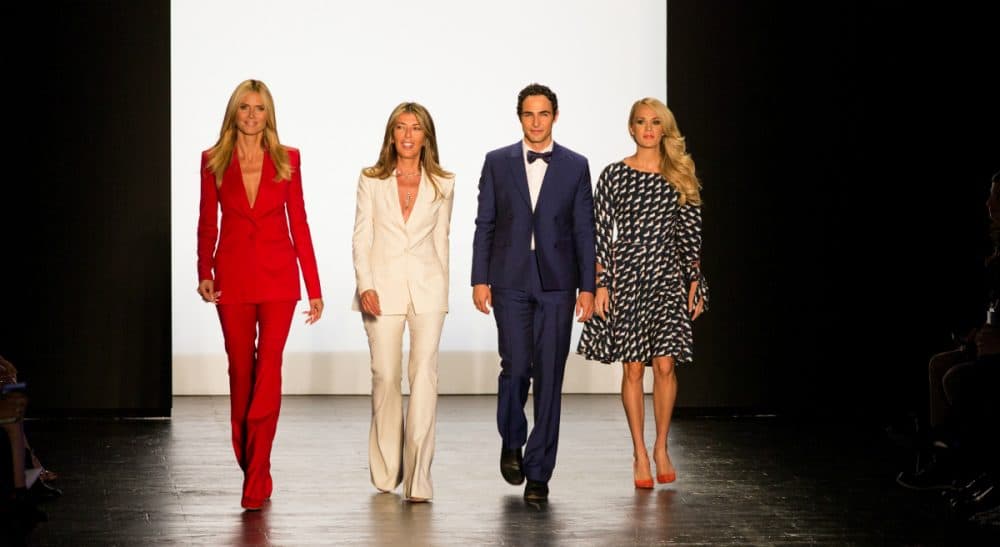Advertisement
Make It Work: Why Political Contests Should Emulate 'Project Runway'

A brief and mild storm recently erupted in the literary world when a major national writers’ organization announced that there would be no winner of their annual nonfiction contest. The judge, a well-respected poet and essayist, deemed none of the hundreds of submissions to be worthy. As one of the rejected, I was initially miffed. But that night, as I forced myself to watch the first Republican presidential candidates’ debate, I began to admire her decision. Why reward anything less than excellent? Does every contest have to have a winner?
Sadly, in the case of presidential politics, the answer is yes. But even if we can’t set a bar for the most powerful position in the world as high as we set it for literary essays, we can still aim to do better. We can try to emulate the contestants and judges of long-running “reality” series, "Project Runway."
Urgency, resourcefulness, creativity -- wouldn’t we be thrilled if the people aspiring to the presidency displayed even one of those characteristics?
For starters, all of the fashion designers competing to win money, supplies, and a coveted runway show at New York City’s Fashion Week (the couture equivalent to the first Tuesday in November) have not just drive, but real talent. Some are self-taught, some formally schooled, but unlike the raft of political candidates, all can actually accomplish something with a few simple tools and their own two hands. These contestants — a diverse amalgamation of pixies, plodders and punks; generally straight women and generally gay men; mean girls like Carly Fiorina and self-righteous bullies like Ted Cruz — turn garbage into, well, if not gold, something at least useful. They make skirts out of strawberry licorice, dresses out of discarded cables and aluminum tubes, jackets out of wilted mattresses and doggie beds. They do it quickly — generally in a day — and with a very limited budget.
Urgency, resourcefulness, creativity — wouldn’t we be thrilled if the people aspiring to the presidency displayed even one of those characteristics?
Sure, like the sequential soundbites masquerading as debates, "Project Runway" manufactures sniping and drama as well. Some exhausted designer who’s run out of fresh ideas or time, who’s sent a model down the runway with a ragged hemline or unflattering silhouette, cries on practically every episode (though unlike Hillary, they don’t have to do so to prove that they’re human beings just like you and me). Contestants sneer and delight in offering withering put-downs of each other’s designs (though unlike Donald Trump, they generally avoid demeaning one another’s looks or menstrual cycles). They fume and erupt under the mounting pressure as one by one, their peers are eliminated from the competition. As show host and producer Heidi Klum incessantly reminds us, “In fashion, one day you’re in, the next day you’re out.” (I bet Herman Cain and Scott Walker agree.) But they also console. They help each other out, sharing fabric and labor, and publicly, ruefully learn their lesson if they put individual achievement ahead the interests of the team.
As show host and producer Heidi Klum incessantly reminds us, 'In fashion, one day you’re in, the next day you’re out.' (I bet Herman Cain and Scott Walker agree.)
But it’s not just the "Project Runway" contestants who should inform and inspire. Party hacks and the voting public alike should strive to emulate the show’s judges as well — at least in some aspects. Don’t get me wrong. I’m not suggesting that we all spend millions on our face and wardrobe like supermodel Heidi Klum, respond to every aesthetic disagreement as a personal slight as does fashion editor Nina Garcia, or mimic designer Zac Posen’s obvious and smug pleasure in our own cleverness. (Come to think of it, they sound more like the candidates than the voters … ) But in evaluating the designers’ products, this trio scrutinizes each item closely, considering not just the impression it makes but how well it’s made. They stress the need to marry personal vision with the needs of the client. They reward collaboration over competition, and consider each designer’s history, ability to learn from past mistakes, and evolve. And perhaps most importantly, they assess the clothing’s function — its utility and durability — and not just its form.
So from now on I’m going to stop referring to "Project Runway" as my guilty pleasure. No, I’m going to extoll it as a beacon of hope, a vision of what the vicious, silly, self-aggrandizing, sometimes delusional and often deceptive political process can aspire to — a competition in which those who succeed are those who have both vision and flexibility, and, to quote Tim Gunn, the show’s indefatigable mentor and cheerleader, “make it work.”
